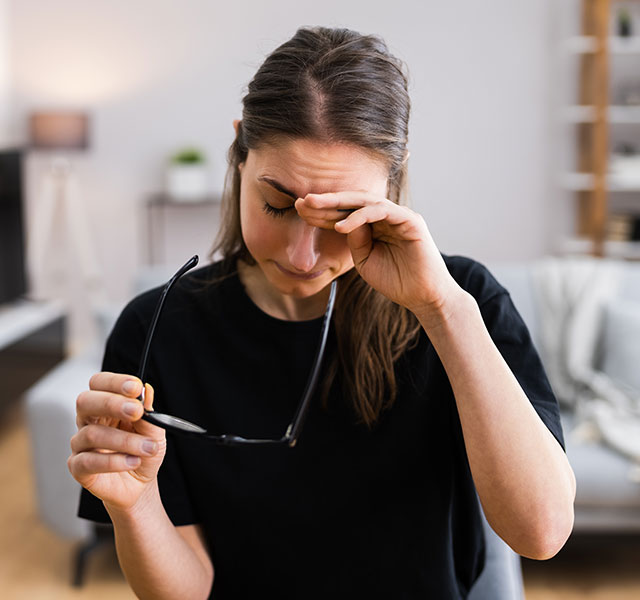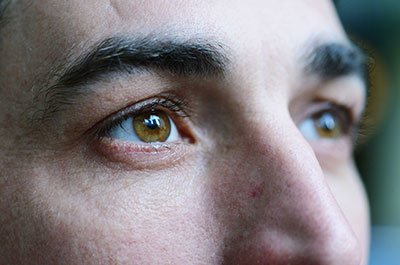Eye scratches can happen any time—when you’re doing housework, mowing the lawn or playing a sport. Sleeping or swimming with contact lenses can also cause eye scratches.
Even though it’s common, if you get an eye scratch (even a mild one), it’s important to seek medical care.
“Any scratch on the eye can become infected, putting your vision at risk. Contact your doctor immediately so you receive treatment to help you heal and avoid further damage to your eye,” says Melisa Nika, M.D., an ophthalmologist at Henry Ford Health.
Types Of Eye Scratches
Scratches can occur on any part of the eye. Dr. Nika says two types are especially common:
- Conjunctiva lacerations: These scratches on the white part of your eye (conjunctiva) can cause irritation, swelling and tearing. Blood spots may appear if a scratch affects the blood vessels in this area. Some people also experience pain with a conjunctiva scratch.
- Corneal abrasion: These scratches occur on the cornea, the clear outer layer of your eye. The cornea has many nerve endings, so these abrasions are painful. They also cause blurry vision.
When Should You Seek Medical Care For An Eye Scratch?

Eye Care At Henry Ford
Scratches on any area of your eye can become infected. “Eye scratches break the eye’s protective barrier, putting your eye at risk for bacterial or fungal infections. Even a minor scratch can become infected,” says Dr. Nika. She recommends seeing your doctor if you suspect your eye is scratched.
Before heading to the doctor, rinse your eye with water to remove debris. To prevent further damage to your eye, avoid:
- Rubbing your eyes
- Trying to use an object to remove material from your eye
- Using over-the-counter redness-reducing or numbing drop
If you have severe eye pain, go to the emergency room for treatment.
How Are Eye Scratches Treated?
Your doctor can examine your eye to determine the location and severity of a scratch. Both conjunctiva lacerations and corneal abrasions are treated with antibiotic eye drops and ointment to prevent infection. The ointment also reduces pain and speeds healing.
If you have a corneal abrasion, your doctor may recommend wearing a bandage contact lens (BCL). The lens, which is larger than a regular contact, covers the cornea to reduce pain. Your doctor places the lens in your eye and removes it after the scratch heals.
If you’ve had one corneal abrasion, you’re at greater risk for more, a condition called recurrent corneal erosion. Any scratch weakens the top layer of the cornea (epithelium), making future scratches more likely. Some people even experience new scratches after opening their eyelids for the first time in the morning.
If you have recurrent corneal erosion, your doctor can recommend treatment. There are several procedures, including laser surgery, to strengthen this outer layer of the eye.
The time it takes to heal from an eye scratch varies depending on its severity and location. Minor scratches on the conjunctiva may heal in a day or two. More severe corneal abrasions or scratches that become infected take longer to heal.
“Some infections, such as fungal infections, are more difficult to treat. That’s why early treatment and monitoring are so important. Attend all follow-up appointments with your doctor and contact them immediately if your symptoms worsen,” says Dr. Nika.
How Can You Prevent Eye Scratches?
Dr. Nika recommends wearing protective eyewear to prevent scratches when doing any activity that puts your eyes at risk. According to the American Academy of Ophthalmology, most eye injuries occur when people aren’t wearing protective glasses or goggles.
“Put on protective eyewear, even if you’re doing a simple task like drilling a hole to hang a picture. Debris from drilling or a nail could unexpectedly hit your eye. Your doctor can recommend appropriate eyewear to fit your needs, whether at work, home or during sports activities,” says Dr. Nika.
She also advises removing contact lenses before sleeping, swimming or showering. Contacts can cause small scratches (micro-abrasions) when worn during these activities.
Eye scratches that happen while you’re swimming in a lake or ocean put you at risk of infection caused by small organisms living in the water. While this type of infection (acanthamoeba keratitis) is rare, it can cause vision loss.
“You can take steps to prevent injury and protect your vision. Protective eyewear, proper contact lens care and regular eye exams can help keep your eyes healthy,” says Dr. Nika.
Reviewed by Dr. Melisa Nika, a comprehensive ophthalmologist and glaucoma specialist who sees patients at the Henry Ford OptimEyes Super Vision Center in Westland.



